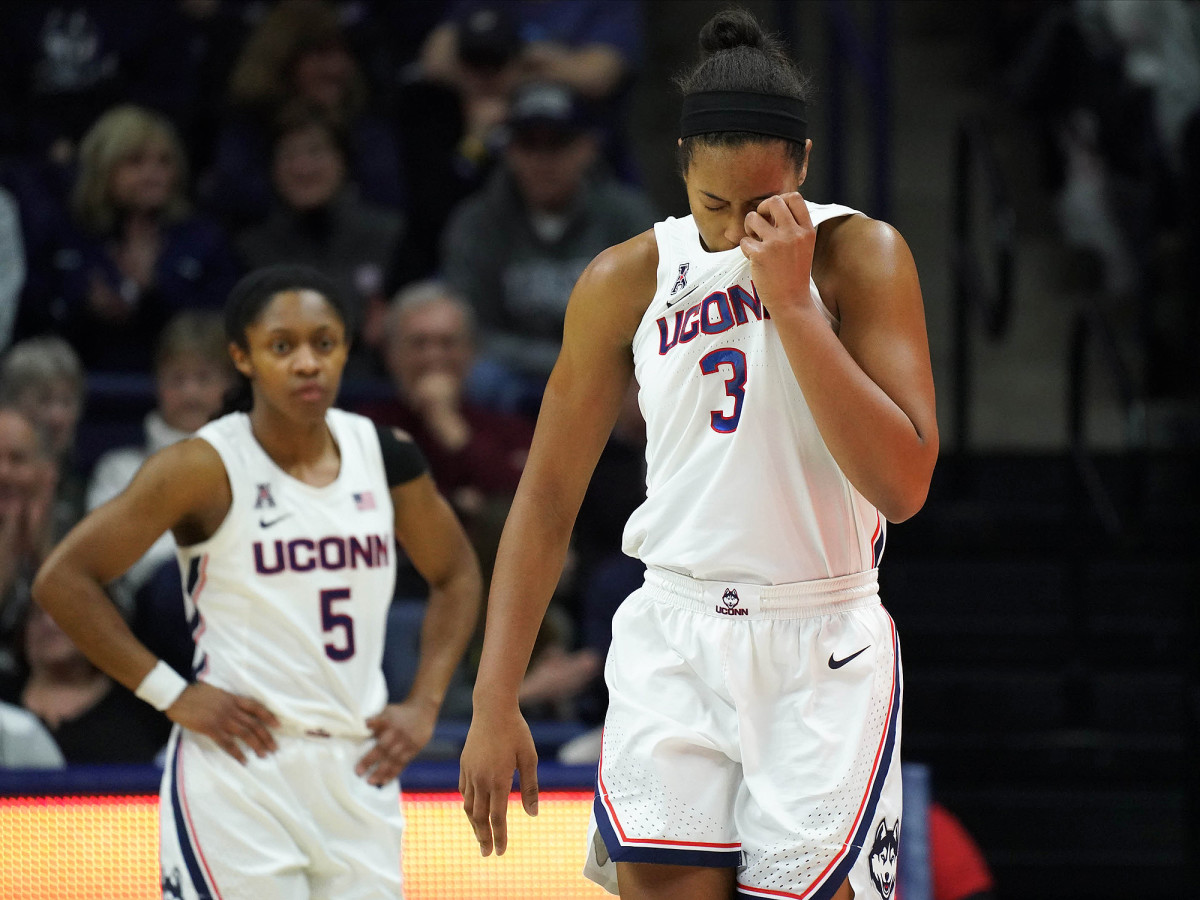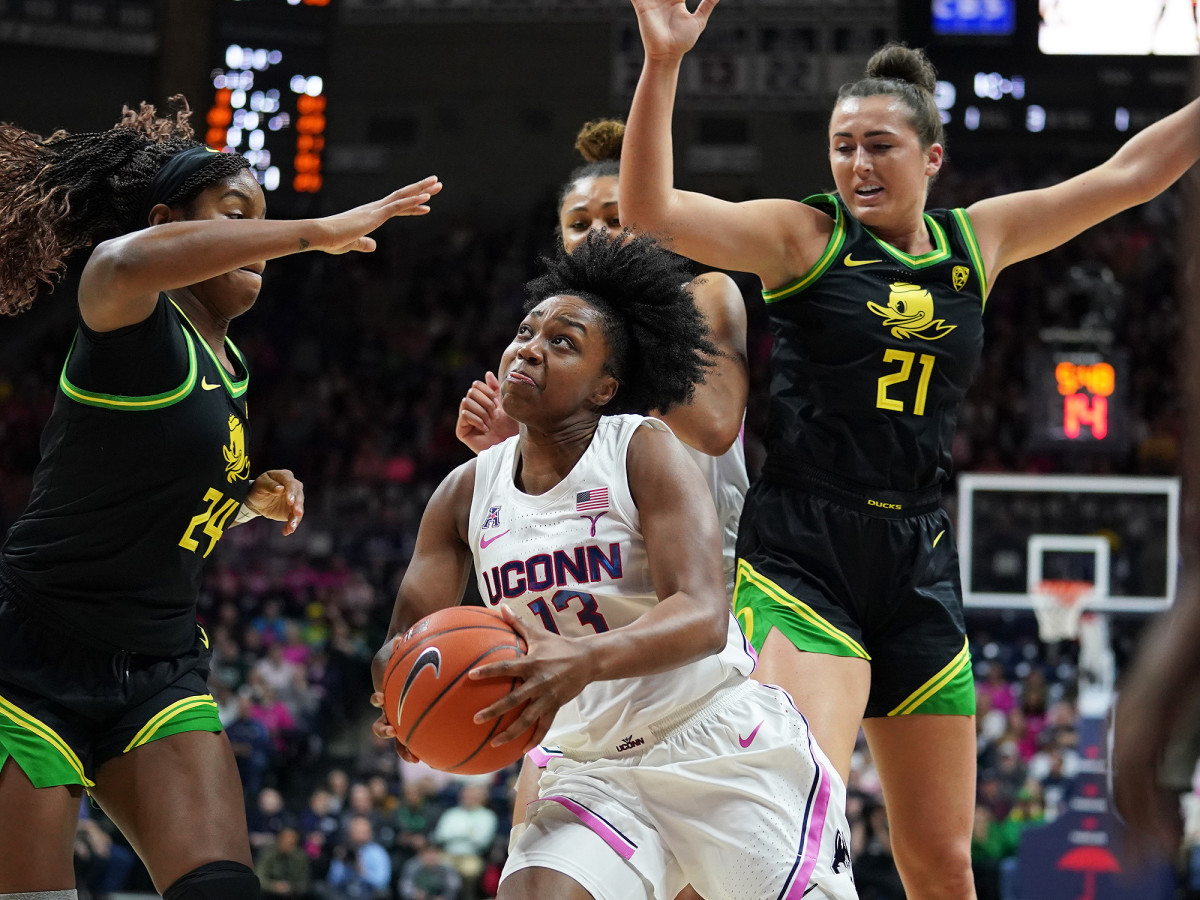UConn Isn't Dominating Women's Basketball Like We're Used to—and That's O.K.

Geno Auriemma sat with arms folded in front of a South Carolina step-and-repeat banner. He looked mad, but not necessarily for the obvious reason, which was that UConn had just lost its third game of the season, and second in a week, by double digits. The No. 1 Gamecocks clobbered the No. 6 Huskies, 70-52.
Auriemma, though, was more irritated by outside expectations than what actually happened on the court.
“We’re allowed to lose a goddamn game once in a while where the other team plays better than us,” Auriemma told reporters then. “South Carolina played way better than Connecticut. That’s allowed to happen once in a while. It’s not like, what did you guys do wrong?”
UConn has earned its reputation as arguably the greatest dynasty in all of sports. It claims 11 national titles, six Naismith National Players of the Year, five No. 1 WNBA draft picks and half the Team USA roster as an alum. The Huskies own various historical streaks, too, including 12 straight years playing in the Final Four.
This season, they’ve made history for different reasons. There was Baylor’s 74-58 win over UConn in early January that ended the program’s 98-game home winning streak. The Bears beat the Huskies last year too, stopping a 126-game regular-season winning streak. Then there was Sabrina Ionescu and Oregon’s 74-56 win over UConn a month later, which marked the program’s worst-loss ever at Gampel Pavilion. And before South Carolina overpowered UConn, the Gamecocks had been 0-8 all-time against it.

UConn is still beating opponents by an average of 22.3 points per game, but its lack of dominance against the country’s top-tiered teams makes us uncomfortable. We’re so accustomed to it annually being the top seed of the NCAA tournament, winning titles and being the gold standard that when it's not those things, critics, fans and media alike go so far as to wonder if the dynasty needs a revival.
“It’s almost like a can’t-win situation,” says Rebecca Lobo, the UConn legend and national champion-turned ESPN broadcaster. “When you’re winning all the time, the story becomes, ‘Is UConn bad for women’s basketball?’ Then when you lose some games, you have to deal with over-the-top criticism.
“I get it. [Auriemma] has built something in Storrs that has been at the pinnacle for a really long time. It’s without question the best program in the history of the women’s game. So when they have struggles, the spotlight will be even brighter and that’s fine.”
According to the latest Bracketology, UConn (24-3) is expected to be a No. 2 seed in the upcoming NCAA tournament. Right now, ESPN has the Huskies in the Greenville region, which would pit them against No. 1 South Carolina in the Elite Eight.
But people forget that UConn has been here before. In 2004-05, after winning three straight national championships, UConn missed the Final Four when Stanford ended its 20-game NCAA tournament winning streak. The next year, UConn was a No. 3 seed and lost to Duke in the Sweet 16—in a Bridgeport, Conn. regional no less. The following season the Huskies ran into Sylvia Fowles and LSU and lost in the Elite Eight.
“Critics can’t have it both ways,” Lobo says. “You can’t say UConn’s dominance was bad for women’s basketball and then be like, ‘What’s wrong with UConn?’ when teams are showing that they’re on the rise. Ultimately, it’s good for the women’s game to have what we see this year with so many upsets, unranked teams beating ranked teams, and multiple No. 1s.”
Lobo also points out that if UConn had only played South Carolina and not Baylor and Oregon (which it did to beef up an otherwise uncompetitive American Athletic Conference schedule), it'd probably be a top-three team and this wouldn’t be a discussion.
“So that’s kind of the part of it that’s unfair,” Lobo says.

While UConn’s unusual lack of swagger and greatness dominates the national conversation, the parity of the women’s game should really be what takes center stage. Auriemma recently admitted this to ESPN: “When we lost the last three [years], somebody said, ‘Well, you know, the only time those guys win the national championship is when they have the best player. No s---.”
UConn has won titles with stars like Diana Taurasi, Maya Moore and Breanna Stewart. But since Stewart graduated four years ago, the Huskies haven’t had the most elite players despite consistently recruiting top prospects. Notre Dame had last year’s No. 1 pick, Jackie Young. Oregon has Ionescu. Louisville had Asia Durr. Baylor has Lauren Cox.
“You have to appreciate what the game is turning into, what it’s become and how it’s grown,” Lobo says.
Last spring, UConn lost first-round picks Katie Lou Samuelson and Napheesa Collier, who was the 2019 WNBA Rookie of the Year, leaving senior Crystal Dangerfield to lead the team as the main true veteran. The starting lineup consists of one senior (Dangerfield), a junior (Megan Walker), two sophomores (Christyn Williams and Olivia Nelson-Adoda) and a freshman (Anna Makurat). This is a team that’s been to the Final Four, but doesn’t have the experience playing for a title.
“They’re a group of players who are still figuring it out and ultimately, relying on young people,” Lobo says. “In the past they’ve always had at least two seniors who could show everyone else how it’s done. I think that makes it a little more difficult.”
UConn will be dominant again. Maybe next season when the nation’s No. 1 overall recruit, guard Paige Bueckers, arrives on campus. Bueckers has that charisma and confidence that UConn has been missing recently. She’s a McDonald’s All American, has won gold medals playing for the U19 and U17 FIBA World Cup teams and Auriemma has compared her game to Taurasi’s. In other words, she’s by all accounts going to be UConn’s next big thing.
And she’ll have talent returning with players like Walker, Williams and Nelson-Adoda to lead the way.
Until then, it’s O.K. that UConn is having a different year than we’re used to watching as other programs get time in the spotlight. Alabama didn’t make the College Football Playoff. The Patriots didn’t make the Super Bowl. The Warriors didn’t win the NBA Finals.
“This year the object is get through the season, get in the NCAA tournament, see what happens,” Auriemma said in the South Carolina post-game. “This year we’re like every other team in the country. God-forbid.”
